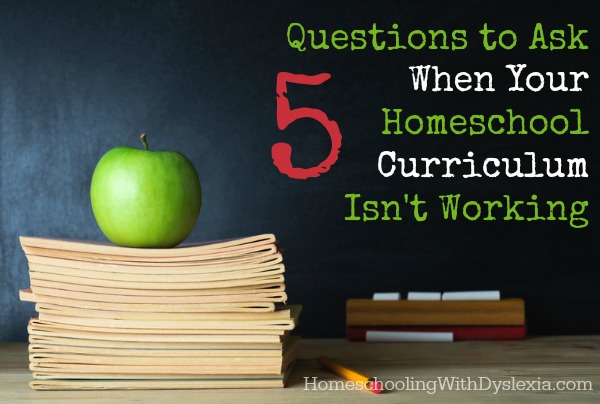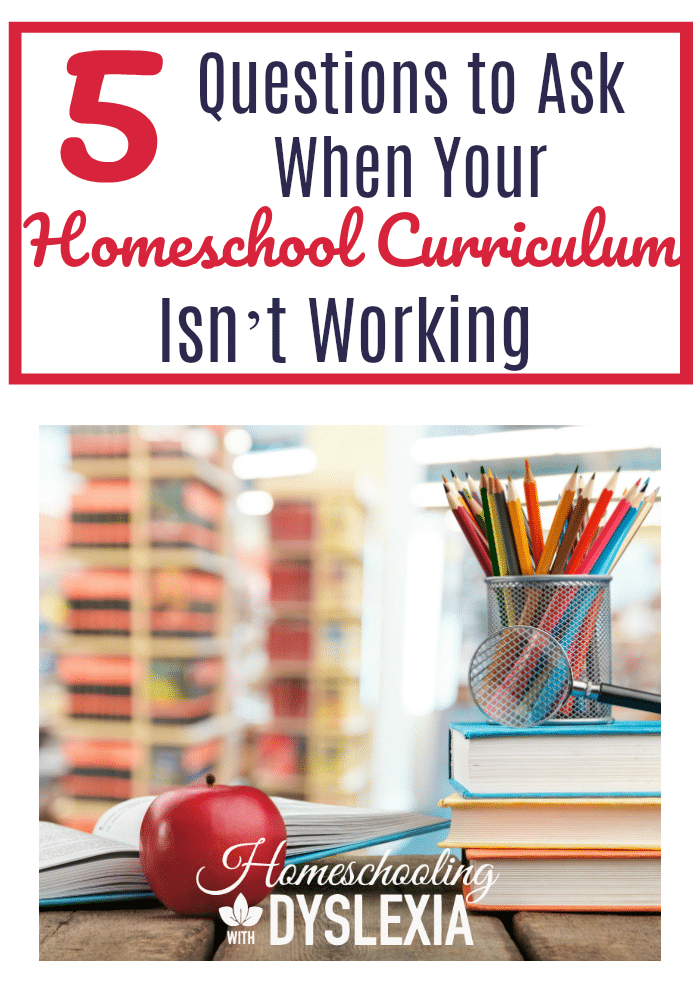After mentoring a homeschool mom who was concerned because her homeschool curriculum isn’t working, I came up with the following guidelines for when you get stuck with a curriculum that doesn’t seem to be ‘working’. The solution may not be what you’d expect!

I recently consulted with a sweet mom who was looking for guidance in homeschooling her 13-year old dyslexic daughter. Both mom and daughter were overwhelmed and heading towards burnout mode by the amount of work in their chosen homeschool curriculum. She contacted me to help her find the place where her daughter was learning and engaged, even challenged, but not overwhelmed. As I pondered her situation and considered all of my years of homeschooling kids with dyslexia, I came up with the following guidelines for when you get stuck with a curriculum that doesn’t seem to be ‘working’.
Truths About Homeschool Curricula
First, let’s establish a healthy understanding of homeschool curricula in general.
Curriculum is great but it is not in control – you are!
What I mean by this is that many of us place too much value on curriculum. We put it on a pedestal and our lives revolve around lesson plans and schedules and quizzes and tests. This is especially true for those of us, like myself, who fit so comfortably into the traditional school scene during our own school years. How this translates into your day-to-day is that you have the freedom to customize your curricula to fit your unique family’s needs.
Not all curriculum is created equally.
Dyslexic kids learn differently. It is the main reason why many of us began, and continue, to homeschool our dyslexic kids. The traditional teaching methods of our public and private schools is not the best fit for kids with dyslexia. However, if we are homeschooling and we subscribe to Homeschool Curriculum Truth Number One (above), we can alter or replace our curricula to meet our kids needs.
No curriculum will be a perfect fit.
They will all need some tweaking and modifying. Some lessons will be too long and need to be divided up. Some lessons will not be clear so you will need to find a way to teach it differently. Don’t fret about this. Relax and try to be creative when you teach your dyslexic kids.
Curriculum should be a reasonable fit for both mom and student’s learning styles.
My poor kids! I am such a left-brained, linear thinker. Although they could spend the entire day illustrating their flash cards or acting out history stories, that would probably drive me crazy. We have had to find a happy medium where our kids can do hands-on learning without overtaking the house. A sane mom is a better mom, no?
Most families learn by trial and error which curricula are a good fit for their kids.
Don’t feel bad if you need to switch your curriculum. It is part of the learning curve. A quick visit to eBay and you’ll be on your way! Visit our Resources Page for some of our top picks for homeschool curricula.
We have the freedom to modify or replace our curricula, but before we do that here are some questions to ask to help you:
Questions to Ask When Tailoring and Choosing Homeschool Curricula for Your Dyslexic Student

1. What are my educational goals for my child at this point in time? Younger kids who are still working on mastering the basics of reading, spelling and writing have a lot on their plates just getting the 3 Rs done each day, however this is a critically important step and cannot be compromised. Older kids who are gaining some mastery have different goals. My middle school goals have traditionally been to help my kids become more independent learners. Older kids, high school level say, have different goals still. During these years our focus should be more on their future – after school. What are their interests and abilities? What are their future educational and vocational goals? These differing goals need to be taken into consideration as we seek to create a homeschool routine that serves our kids to the best of our ability and to the full extent that our homeschooling freedom allows.
2. What are my educational priorities for my child at this point in time? These priorities will be based off of the goals that you listed from question one above. If you are still in the remediation phase of teaching your dyslexic kids, then this is absolutely a priority. And here is a news flash – you probably won’t be able to get every subject done in depth during this phase – and, wait for it, that is absolutely okay. The more you focus on remediation, the faster it will take place and you will be able to transition into more independent and in depth learning in time. During this phase of focusing on remediation, we have used our daily read aloud time to read historical fiction and interest-based science books to our kids. Educational DVDs are also an excellent option during the time intensive years of remediation. I assure you, you do not need to complete a full science and history curriculum every year in the elementary years. I’m not saying to ignore those subjects just that you can create an excellent, gentle, interest-based curriculum from read alouds and documentaries. Always filter your decisions about curriculum through the lens of your current goals and priorities. There is only so much time – you have to make it count!
3. How would accommodations help? A few years ago, my 9th graders were working through a science curriculum that wasn’t working for us. It was somewhat video based which I thought would be a good fit for my visual learners. When I say that it wasn’t working, I mean that one of my goals was for the kids to become more independent learners and with this curriculum, they were definitely not able to work independently. The material was complicated and so the reading was bogging them down. Because the curriculum was Internet-based and the reading assignments were online, we utilized a simple, free text-to-speech app and they were able to have their reading assignments read to them. Unfortunately, they were still struggling to understand the material. We divided up the curriculum so that I was able to spend one day a week reading the assignments out loud or listening to the text-to-speech app read aloud, which was not ideal. When we got to a topic that we didn’t understand, we Googled, YouTubed and checked Kahn Academy for videos with better explanations. By using accommodations, we made it through the curriculum, but I definitely did not choose it for 10th grade.
For a more in-depth look at accommodations, read this post, Understanding Accommodations and Remediations and this one, Best Accommodations for the Dyslexic Student. From these posts you will have a better understanding of effective ways to accommodate your dyslexic student.
4. Is the curriculum too difficult or can I make modifications? Depending on your goals and priorities for your kids, you can modify a curriculum to better fit your needs.
Examples of modifications that we have used are:
- Skimming over chapters of relative disinterest and spending more time on topics of interest. Interest-based learning makes everyone’s life easier.
- Discussing, instead of writing, end of chapter comprehension questions.
- Memorizing vocabulary terms in a science curriculum with the multi sensory app Quizlet instead of completing the tests and quizzes.
- Mom uses the text book as a guide for the scope and sequence to be followed and uses library books and DVDs to cover the material.
5. Would we be better off replacing the curricula with something better suited to our kids needs? While many, if not most, curricula can be modified to accommodate the dyslexic learner, sometimes it is just too much work for mom. You will know if it is too much work if you as the parent have made modifications and allowed accommodations and still the program is a major source of frustration. Please note, however, that all kids will complain from time to time about certain subjects. My 11th grade son regularly complains about his science curriculum while raving about his history curriculum. They are both from the same curriculum company; however, he loves History and has little interest in Science. Only you, as the parent and teacher know your child well enough to make this distinction.
Every year you will likely have different goals and different priorities within your homeschool. Figuring out what those are are part of the freedom and responsibility of homeschooling and the thought process gets much easier over time.
How about you? How have you learned to work with your homeschool curricula to make it work?
Other posts of interest:
Modifying Homeschool Curricula for the Dyslexic Student
How to Choose a Homeschool Curriculum
Homeschooling With Dyslexia: What to Expect







Greetings! I’ve been reading your web site for a long time now and finally got the courage to go ahead and
give you a shout out from Austin Texas! Just wanted to mention keep up the fantastic work!
Fantastic info, thanks so much for all you share! You have been a lifesaver!
You’re welcome Kate!